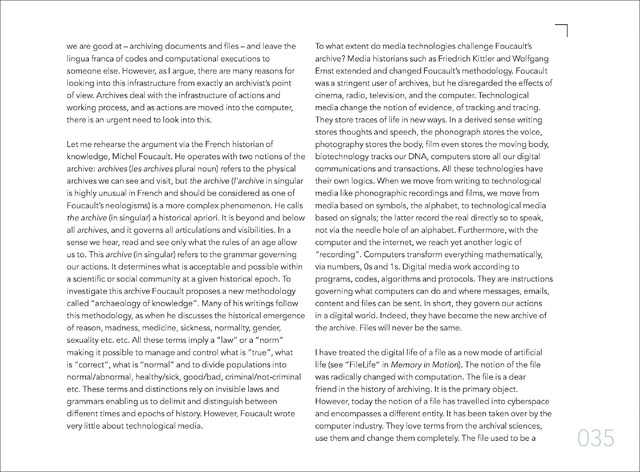we are good at - archiving documents and files - and leave the
lingua franca of codes and computational executions to
someone else. However, as I argue, there are many reasons for
looking into this infrastructure from exactly an archivist's point
of view. Archives deal with the infrastructure of actions and
working process, and as actions are moved into the computer,
there is an urgent need to look into this.
Let me rehearse the argument via the French historian of
knowledge, Michel Foucault. He operates with two notions of the
archive: archives (les archives plural noun) refers to the physical
archives we can see and visit, but the archive (l'archive in singular
is highly unusual in French and should be considered as one of
Foucault's neologisms) is a more complex phenomenon. He calls
the archive (in singular) a historical apriori. It is beyond and below
all archives, and it governs all articulations and visibilities. In a
sense we hear, read and see only what the rules of an age allow
us to. This archive (in singular) refers to the grammar governing
our actions. It determines what is acceptable and possible within
a scientific or social community at a given historical epoch. To
investigate this archive Foucault proposes a new methodology
called "archaeology of knowledge". Many of his writings follow
this methodology, as when he discusses the historical emergence
of reason, madness, medicine, sickness, normality, gender,
sexuality etc. etc. All these terms imply a "law" or a "norm"
making it possible to manage and control what is "true", what
is "correct", what is "normal" and to divide populations into
normal/abnormal, healthy/sick, good/bad, criminal/not-criminal
etc. These terms and distinctions rely on invisible laws and
grammars enabling us to delimit and distinguish between
different times and epochs of history. However, Foucault wrote
very little about technological media.
To what extent do media technologies challenge Foucault's
archive? Media historians such as Friedrich Kittler and Wolfgang
Ernst extended and changed Foucault's methodology. Foucault
was a stringent user of archives, but he disregarded the effects of
cinema, radio, television, and the computer. Technological
media change the notion of evidence, of tracking and tracing.
They store traces of life in new ways. In a derived sense writing
stores thoughts and speech, the phonograph stores the voice,
photography stores the body, film even stores the moving body,
biotechnology tracks our DNA, computers store all our digital
communications and transactions. All these technologies have
their own logics. When we move from writing to technological
media like phonographic recordings and films, we move from
media based on symbols, the alphabet, to technological media
based on signals; the latter record the real directly so to speak,
not via the needle hole of an alphabet. Furthermore, with the
computer and the internet, we reach yet another logic of
"recording". Computers transform everything mathematically,
via numbers, 0s and 1s. Digital media work according to
programs, codes, algorithms and protocols. They are instructions
governing what computers can do and where messages, emails,
content and files can be sent. In short, they govern our actions
in a digital world. Indeed, they have become the new archive of
the archive. Files will never be the same.
I have treated the digital life of a file as a new mode of artificial
life (see "FileLife" in Memory in Motion). The notion of the file
was radically changed with computation. The file is a dear
friend in the history of archiving. It is the primary object.
However, today the notion of a file has travelled into cyberspace
and encompasses a different entity. It has been taken over by the
computer industry. They love terms from the archival sciences,
use them and change them completely. The file used to be a

